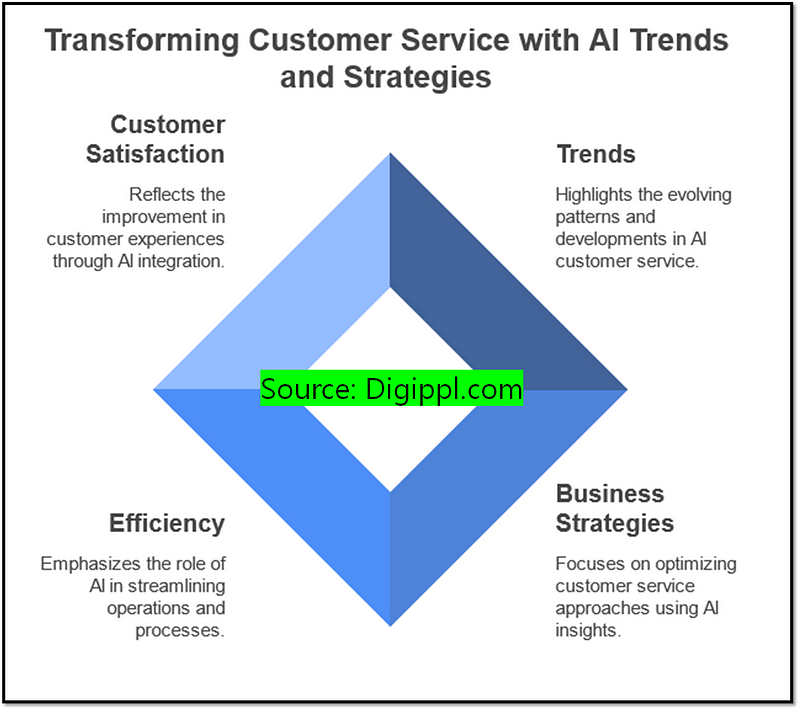Your customer service experience sets you apart from your competitors, and we have the customer service statistics to support this.
Learn how you can leverage AI in customer service to increase efficiency, reduce operational costs, and provide quick and personalized support.
In the evolving landscape of customer service, artificial intelligence (AI) is playing a crucial role.
Transforming Customer Service with AI Trends and Strategies

- Customer Satisfaction: Reflects the improvement in customer experiences through AI integration.
- Trends: Highlights the evolving patterns and developments in AI customer service.
- Efficiency: Emphasizes the role of AI in streamlining operations and processes.
- Business Strategies: Focuses on optimizing customer service approaches using AI insights.
This blog post presents over 25 essential statistics that highlight the trends in AI customer service as we move into 2025.
By understanding these trends, businesses can optimize their customer service strategies, enhance efficiency, and ultimately improve customer satisfaction.
30 Key Statistics and Trends for Customer Service
- AI Adoption Rate: By 2025, it is projected that 85% of customer interactions will be managed without a human agent, showcasing a significant shift towards AI-driven solutions.
- Cost Reduction: Companies utilizing AI in customer service are expected to reduce operational costs by up to 30%, allowing for reallocation of resources to other critical areas.
- Customer Satisfaction: AI-driven customer service tools are anticipated to improve customer satisfaction scores by 20%, as they provide quicker and more accurate responses.
- Response Time: The average response time for customer inquiries is expected to decrease to under 5 seconds with the implementation of AI chatbots.
- 24/7 Availability: AI systems will enable businesses to offer round-the-clock customer service, with 70% of companies planning to implement this capability by 2025.
- Personalization: 60% of consumers are more likely to engage with brands that utilize AI to provide personalized experiences based on their previous interactions.
- Self-Service Options: By 2025, 75% of customers will prefer self-service options powered by AI over speaking to a human agent.
- AI in Social Media: 50% of customer service interactions on social media platforms will be handled by AI, streamlining communication and response processes.
- Integration with CRM: 65% of businesses will integrate AI tools with their Customer Relationship Management (CRM) systems to enhance data analysis and customer insights.
- Training AI Systems: Companies will invest an average of $1.5 million annually in training AI systems to improve their customer service capabilities.
- Voice Assistants: The use of voice-activated AI assistants in customer service is projected to grow by 40% by 2025, reflecting a shift in consumer preferences.
- Feedback Collection: AI will facilitate the collection of customer feedback, with 80% of businesses planning to use AI tools for this purpose.
- Fraud Detection: AI will play a crucial role in detecting fraudulent activities, with 90% of financial institutions expected to implement AI solutions for this purpose.
- Employee Productivity: Businesses that adopt AI in customer service report a 25% increase in employee productivity, as routine tasks are automated.
- Multilingual Support: AI will enable companies to provide multilingual support, with 55% of businesses planning to implement this feature by 2025.
- Data Security: 70% of consumers express concerns about data security in AI customer service, prompting businesses to prioritize secure AI solutions.
- Customer Retention: Companies using AI for customer service are expected to see a 15% increase in customer retention rates.
- AI Training Data: The quality of training data will be a significant factor, with 80% of AI projects failing due to poor data quality.
- Chatbot Usage: By 2025, 90% of businesses will have deployed chatbots for customer service, reflecting their growing importance. Find more chatbot stats at Digippl.com.
- AI and Human Collaboration: 65% of customer service leaders believe that AI will enhance human agents’ performance rather than replace them.
- Predictive Analytics: AI will enable predictive analytics in customer service, with 50% of companies planning to use this technology to anticipate customer needs.
- Customer Journey Mapping: 60% of businesses will utilize AI to map customer journeys, improving the overall customer experience.
- Training Costs: The average cost of training AI systems for customer service is expected to decrease by 20% as technology advances.
- Customer Engagement: AI will increase customer engagement rates by 30%, as businesses leverage data to create targeted marketing strategies.
- Future Investments: By 2025, it is estimated that global investment in AI customer service technology will exceed $10 billion.
5 Tips to Optimize Business Efficiency
- Invest in Quality Data: Ensure that the data used to train AI systems is of high quality to improve accuracy and effectiveness.
- Embrace Multichannel Support: Utilize AI across various platforms to provide seamless customer service experiences.
- Focus on Personalization: Leverage AI to analyze customer data and deliver personalized interactions that enhance satisfaction.
- Monitor and Adapt: Regularly assess the performance of AI tools and make necessary adjustments to optimize their effectiveness.
- Train Human Agents: Equip human agents with the skills to work alongside AI, enhancing overall service quality.
By understanding these statistics and trends, businesses can strategically implement AI in their customer service operations, leading to improved efficiency and customer satisfaction in 2025 and beyond.
AI is changing customer service by making it more efficient, personalized and accessible to all.

Leave a Reply